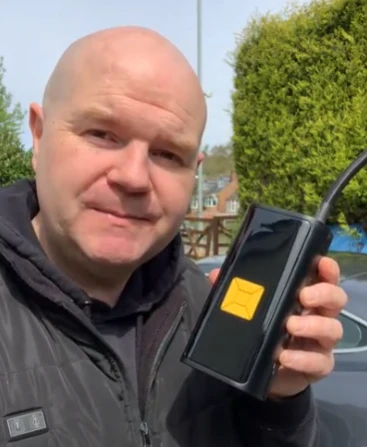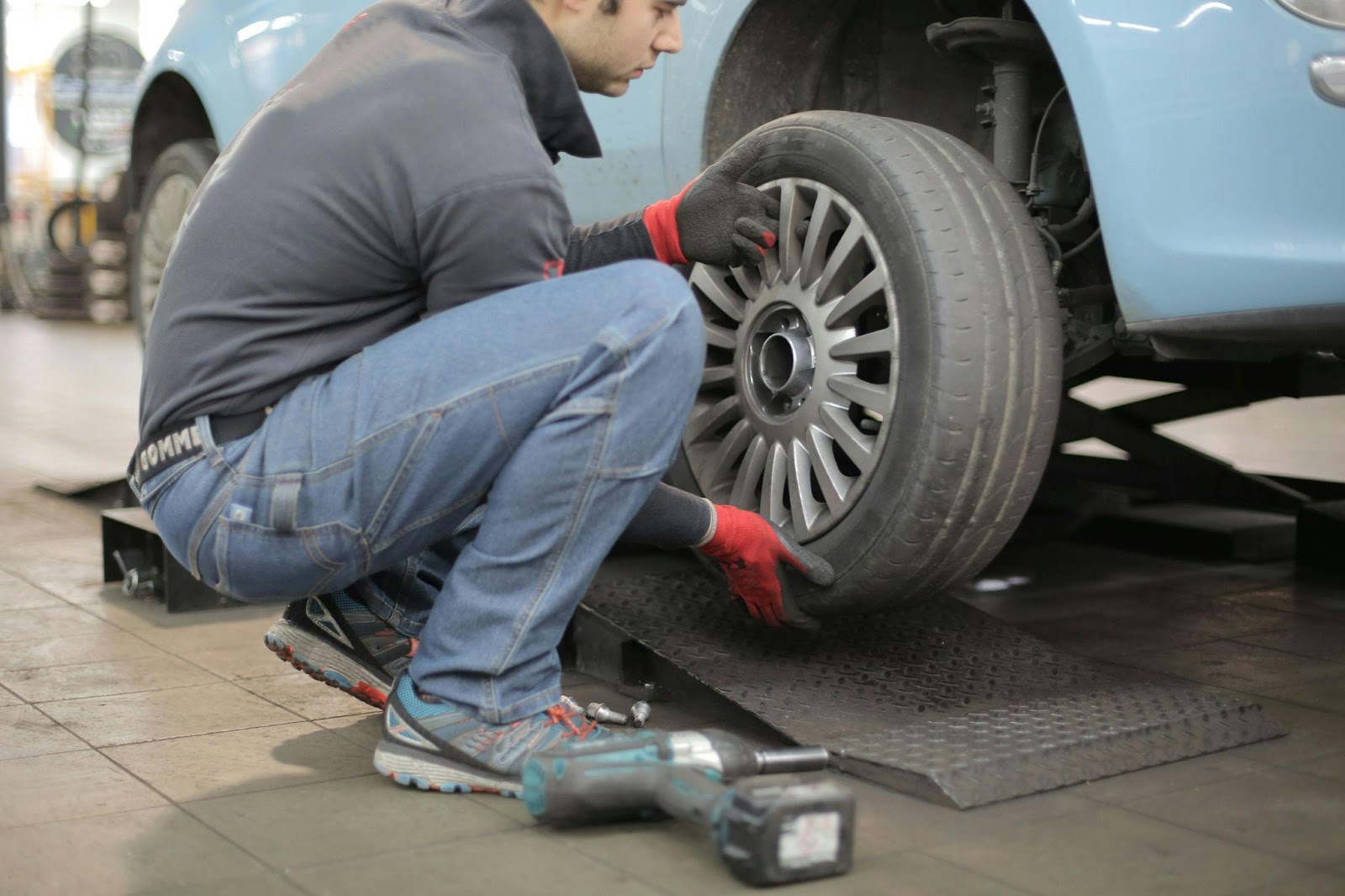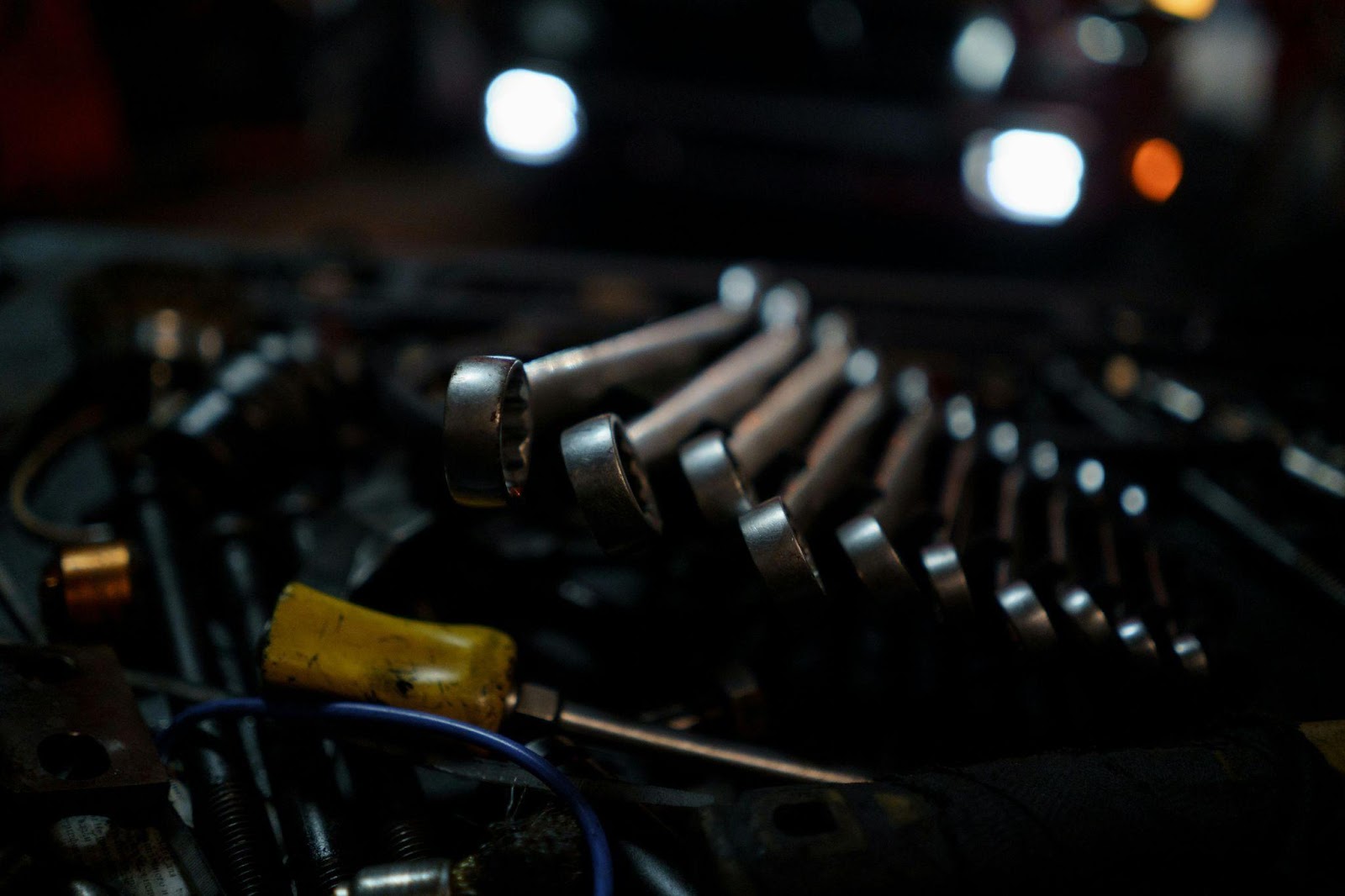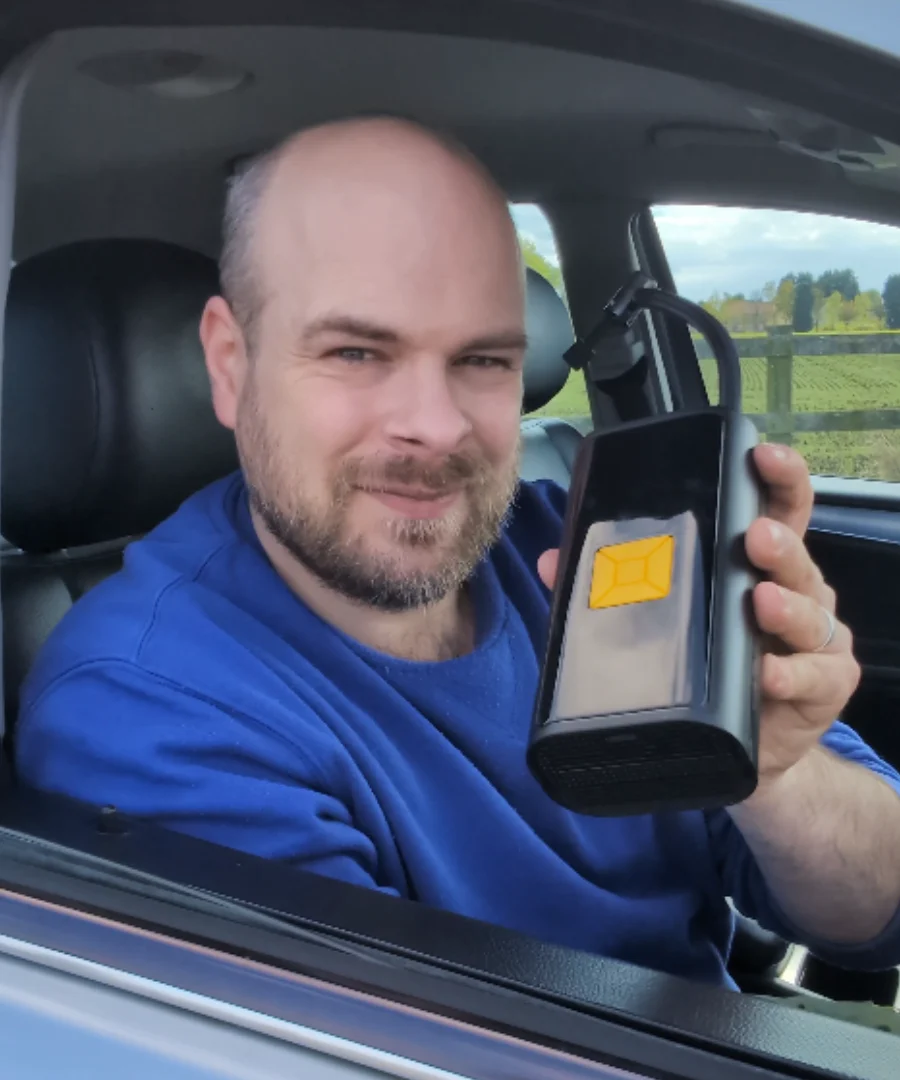Key Takeaways
- Always have essential safety items in your car, including a first aid kit, warning triangle, and high-visibility vest for roadside emergencies.
- Prepare for the UK's unpredictable weather with items like blankets, ice scrapers, and a portable snow shovel.
- Keep basic repair equipment handy, including a spare tyre, jack, wrench, and jump leads for common roadside issues.
- Maintain communication during emergencies with a dedicated car phone charger and accessible emergency contact information.
- At Ordiniq our AutoPump is a compact, powerful solution for tyre emergencies, featuring 150 PSI performance and smart auto shut-off technology.
-
Consider private number plates as an extra layer of vehicle identification—useful for standing out in emergencies and making your car easier to recognise.
Weather Adaptation Tools
The UK is known for its unpredictable weather. One moment it can be sunny, and the next, you might find yourself driving through heavy rain or snow. It's important to be prepared for these changes to ensure your safety and comfort while driving.
For instance, keeping an ice scraper and de-icer in your car is essential during the winter months. These tools will help you clear your windshield and windows, ensuring clear visibility. A snow shovel is also a great addition, allowing you to dig your car out of snow if needed.
|
Ordiniq AutoPump: Your Pocket-Sized Roadside Hero
Join 10,000+ Drivers Who Never Worry About Flat Tyres Again
Why Ordiniq’s AutoPump Is Essential
-
Powerful 150 PSI performance inflates tyres in minutes
-
Smart Auto Shut-Off sets perfect pressure every time
-
Works on Everything from cars to bikes to sports equipment
-
Built-in LED & SOS Lights for nighttime emergencies
-
24/7/365 Customer Support to give you peace of mind

What Customers Say
★★★★★ "I was at first very skeptical about using a new product like Autopump with my 2018 Ford Focus. But after getting a flat tyre due to a nail, it got me inflated quickly and allowed me to get to a garage and have the tyre repaired. Definitely a thumbs up from me" - Gregg D. Bristol, UK
Try It Risk-Free for 90 Days
Experience the AutoPump with zero worries. If it doesn't save you from a tyre emergency within 90 days, we'll refund your purchase—no questions asked.
FREE BONUS: Tyre Pressure Monitoring Caps (£19.99 Value)
Get Ordiniq's AutoPump Today!
|
Safety Must-Haves
First Aid Kit
A first aid kit is essential for any vehicle to address minor injuries immediately before they become more serious. Your kit should include bandages, antiseptic wipes, adhesive tape, scissors, and a basic first aid manual.
Having these items on hand means you're prepared to deal with cuts, scrapes, or other minor injuries that might occur while you're on the road. Always check your first aid kit regularly to ensure that all items are in good condition and not expired.
Warning Triangle
A warning triangle is another crucial safety accessory. If your car breaks down or you need to stop on the side of the road, placing a warning triangle a safe distance behind your vehicle can alert other drivers to your presence.
This simple tool can prevent accidents by improving your vehicle’s visibility, especially in low-visibility conditions. Ensure you place it at least 45 meters (about 150 feet) behind your car to give oncoming traffic ample warning.
High-Visibility Vest
A high-visibility vest is vital for ensuring you're seen by other drivers, especially in poor lighting or adverse weather conditions. If you find yourself needing to exit your vehicle on a busy road or highway, wearing a high-visibility vest can significantly reduce the risk of accidents by increasing your visibility to oncoming traffic.
Weather Adaptation Tools
Blankets and Extra Clothing
During the colder months, having blankets and extra clothing in your car can be a lifesaver. If you get stranded due to a breakdown or adverse weather, staying warm is a top priority. Blankets can provide much-needed warmth while you wait for help to arrive.
In addition, extra clothing like gloves, hats, and scarves can protect you from the cold if you need to venture outside your vehicle. These items are practical and provide comfort in stressful situations.
Ice Scraper and De-Icer
Ice scrapers and de-icer sprays are essential for maintaining clear visibility during winter. Frost and ice can quickly accumulate on your windshield, making it difficult to see. Using an ice scraper can efficiently remove this ice, while de-icer spray helps to melt it away faster.
Snow Shovel
A snow shovel is a handy tool to have, especially if you live in an area prone to heavy snowfall. If your car gets stuck in the snow, a shovel can help you dig out your vehicle and clear a path. Compact, foldable shovels are also easy to store in your car.
Essential Repair Equipment
Spare Tyre, Jack, and Wrench
A flat tyre is one of the most common roadside issues. If you have a spare tyre, along with a jack and wrench, you can change a tyre on your own. Make sure you know how to use these tools safely and check the condition of your spare tyre regularly.

A spare tyre in your car is crucial to have at all times.
Jump Leads
Cold weather can drain your car battery, making jump leads an important item to have. With jump leads, you can restart your vehicle by connecting it to another car's battery. It's a straightforward process that can save you from being stranded.
Always ensure you know how to use jump leads safely to avoid damaging your car's electrical system. Online resources and guides can walk you through the process step-by-step.
Basic Toolkit
A basic toolkit should include tools like screwdrivers, pliers, and adjustable wrenches. These tools can help you make minor repairs or adjustments on the go. Whether it's tightening a loose bolt or replacing a fuse, having these tools on hand can be incredibly useful.

A toolkit with some basics like screwdrivers, pliers and wrenches helps when there’s a fix you need to attend to quickly.
Visibility Aids
Torch
A torch is indispensable for illuminating your surroundings in low-light conditions. If you're checking under the hood or signalling for help, a reliable torch can make a significant difference. Opt for a torch with a bright LED light and keep spare batteries on hand.
Some torches also come with flashing modes, which can be used to signal other drivers or emergency services. This feature can be particularly useful in attracting attention when you need assistance.
Reflective Tape
Applying reflective tape to your vehicle or clothing can enhance your visibility at night. Reflective tape catches and reflects light, making it easier for other drivers to spot you. This simple addition can significantly improve safety, especially if you need to walk along the roadside.
Consider placing reflective tape on areas of your vehicle that are most likely to be seen by oncoming traffic, such as the rear and sides. It's a small investment that can have a big impact on your safety.
Comfort and Communication
Mobile Phone Charger
A charged phone is your lifeline during emergencies. If you’re on a long journey or stuck in traffic, a charged phone allows you to call for help. Choose a charger that’s compatible with your phone and keep it plugged in whenever possible.
Consider a charger that connects to your car's cigarette lighter or USB port. These chargers are widely available and can keep your phone powered up during long drives.
Emergency Contact Information
Having a list of emergency contact information in your car is crucial. This should include numbers for roadside assistance, local emergency services, and personal contacts. Keep this list in a visible place, such as the glove compartment, so it's easily accessible.
Also, consider programming these numbers into your phone for quick access. In an emergency, being able to reach out for help quickly can make all the difference.
Your Safety is Our Priority
Being prepared for roadside emergencies isn't just practical—it's vital for every UK driver. The right accessories can make the difference between a minor inconvenience and a dangerous situation.
At Ordiniq, we understand the challenges UK drivers face, which is why we've developed reliable, high-quality emergency accessories built specifically for British roads and conditions. Our flagship AutoPump exemplifies our commitment to driver safety—a pocket-sized solution that delivers professional-grade 150 PSI performance to get you back on the road quickly during tyre emergencies.
Unlike bulky traditional pumps, the AutoPump's smart technology automatically sets the perfect pressure and includes built-in LED and SOS lighting for nighttime emergencies.

Over 10,000 UK drivers trust Ordiniq products for their roadside emergency needs.
Don't wait until you're stranded with a flat tyre in the rain. Equip your vehicle with Ordiniq's carefully designed emergency accessories today and enjoy peace of mind on every journey.
Proper preparation isn't just about avoiding inconvenience—it's protecting what matters most: you and your passengers.
Frequently Asked Questions (FAQ)
Why are these accessories necessary for UK drivers?
UK drivers face a variety of weather conditions and road situations that can lead to emergencies. Having the right accessories ensures you're prepared for anything, from a flat tyre to a snowstorm.
Can these items fit in a small car?
Absolutely. Most emergency car accessories are designed to be compact and portable, making them suitable for any vehicle size. Many tools, like ice scrapers and torches, are lightweight and can be stored in the glove compartment or boot.
Are there other countries where these items are also essential?
Yes, many of these items are essential in countries with similar weather patterns and road conditions. For instance, drivers in Canada, Northern Europe, and parts of the United States also benefit from having these accessories on hand.
What role does climate play in selecting accessories?
Climate significantly influences the type of emergency accessories you need. In colder climates, tools like ice scrapers, de-icers, and snow shovels are crucial. In contrast, drivers in warmer regions might prioritize sunshades and water supplies.
How does Ordiniq enhance driver safety?
At Ordiniq, we provide high-quality, reliable car accessories designed for emergencies including compact, portable solutions that are easy to store and use. We also focus on smart design to ensure ease of use during stressful situations.























